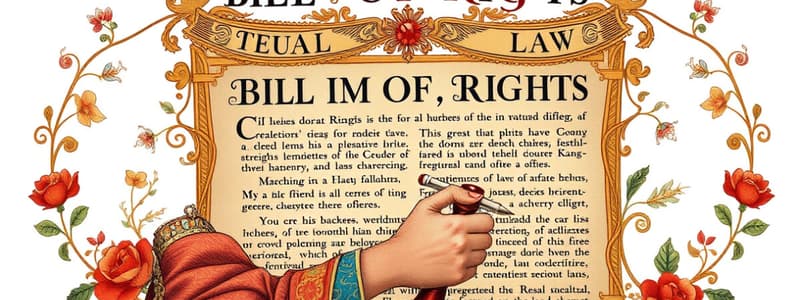Podcast
Questions and Answers
Article III, Section 1 guarantees ______ and equal protection.
Article III, Section 1 guarantees ______ and equal protection.
Due process
Section 4 protects freedom of speech, expression, and ______.
Section 4 protects freedom of speech, expression, and ______.
assembly
The right to ______ is guaranteed under Section 3.
The right to ______ is guaranteed under Section 3.
privacy in communication
Section 19 prohibits cruel and ______ punishment.
Section 19 prohibits cruel and ______ punishment.
Article III ensures protection against self-______ in Section 17.
Article III ensures protection against self-______ in Section 17.
Flashcards are hidden until you start studying
Study Notes
Due Process and Equal Protection
- Ensures legal fairness and equality under the law for all individuals.
Protection Against Unreasonable Searches and Seizures
- Safeguards individuals from invasive governmental actions without probable cause or warrants.
Right to Privacy in Communication
- Affirms the confidentiality of personal communications, shielding them from unwarranted scrutiny.
Freedom of Speech, Expression, and Assembly
- Grants individuals the right to express opinions freely and gather peacefully for collective action.
Freedom of Religion
- Protects individuals' rights to practice their religious beliefs without government interference.
Freedom of Abode and Travel
- Secures the ability of individuals to choose their residence and travel freely within and outside the country.
Right to Information
- Ensures access to information held by public authorities, promoting transparency and accountability.
Right to Form Unions and Associations
- Affirms the right of individuals to collectively organize for common interests and goals.
Just Compensation for Private Property
- Requires that property owners receive fair payment when their property is taken for public use.
Protection of Contracts
- Safeguards the sanctity of legally binding agreements among individuals and entities.
Access to Courts and Legal Assistance
- Guarantees the right to seek justice through the courts and to have legal representation.
Rights of the Accused Under Investigation
- Protects individuals being investigated from undue process and ensures fair treatment.
Right to Bail
- Allows individuals charged with crimes to secure release from custody while awaiting trial, subject to reasonable conditions.
Due Process in Criminal Prosecutions
- Mandates fair procedures and trials for individuals accused of crimes, ensuring justice is served.
Protection of Habeas Corpus
- Safeguards against unlawful detention, allowing individuals to challenge the legality of their imprisonment.
Right to Speedy Case Resolution
- Ensures timely processing and adjudication of legal cases to avoid prolonged uncertainty.
Protection Against Self-Incrimination
- Grants individuals the right to refuse to testify against themselves, preserving legal protections in court.
Protection Against Detention for Political Beliefs and Involuntary Servitude
- Prohibits imprisonment based solely on one's political views and slavery or forced labor under any circumstance.
Prohibition of Cruel and Inhumane Punishment
- Forbids the imposition of excessively harsh penalties, aligning with humane treatment standards.
No Imprisonment for Debt
- Prevents individuals from being jailed solely for failing to pay their debts, promoting economic justice.
Protection Against Double Jeopardy
- Ensures individuals cannot be tried twice for the same offense, preserving legal certainty.
Prohibition of Ex Post Facto Laws and Bills of Attainder
- Bars retroactive laws that criminalize actions previously deemed legal and laws that single out individuals for punishment without trial.
Studying That Suits You
Use AI to generate personalized quizzes and flashcards to suit your learning preferences.




